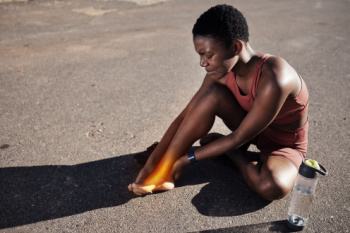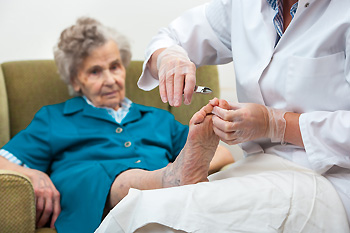Connect With Us
Blog

Feet work hard every day, so it is no surprise that they are prone to a variety of issues. Some of the most common foot problems include bunions, which cause a painful bump at the base of the big toe, and plantar fasciitis, a leading cause of heel pain. Flat feet, high arches, and hammertoes can also lead to discomfort and imbalance. Corns, calluses, and ingrown toenails are often caused by pressure or wearing poor-fitting shoes. Fungal infections like athlete’s foot or toenail fungus are also common, especially in damp environments. Overuse, aging, and medical conditions such as diabetes or arthritis can contribute to or worsen these issues. While some problems may improve with simple changes in footwear or home care, persistent pain or changes in the appearance of the feet should not be ignored, and it is suggested that you see a podiatrist.
Foot Pain
Foot pain can be extremely painful and debilitating. If you have a foot pain, consult with one of our podiatrists from Florida Foot & Ankle Group, P.A.. Our doctors will assess your condition and provide you with quality foot and ankle treatment.
Causes
Foot pain is a very broad condition that could be caused by one or more ailments. The most common include:
- Bunions
- Hammertoes
- Plantar Fasciitis
- Bone Spurs
- Corns
- Tarsal Tunnel Syndrome
- Ingrown Toenails
- Arthritis (such as Gout, Rheumatoid, and Osteoarthritis)
- Flat Feet
- Injury (from stress fractures, broken toe, foot, ankle, Achilles tendon ruptures, and sprains)
- And more
Diagnosis
To figure out the cause of foot pain, podiatrists utilize several different methods. This can range from simple visual inspections and sensation tests to X-rays and MRI scans. Prior medical history, family medical history, and any recent physical traumatic events will all be taken into consideration for a proper diagnosis.
Treatment
Treatment depends upon the cause of the foot pain. Whether it is resting, staying off the foot, or having surgery; podiatrists have a number of treatment options available for foot pain.
If you have any questions, please feel free to contact one of our offices located in Debary, Lake Mary, Orlando, and Oviedo, FL . We offer the newest diagnostic and treatment technologies for all your foot care needs.

As people age, the feet often experience changes that can lead to discomfort and mobility issues. Elderly individuals frequently develop bunions, which are bony bumps that form at the base of the big toe and can cause pain, swelling, and difficulty with footwear. Thickened or discolored toenails are also common and may be caused by fungal infections or difficulty with proper nail care. Corns, which are areas of thickened skin from repeated pressure or friction, can lead to tenderness and a burning sensation. These foot problems may affect balance and increase the risk of falls. Symptoms such as aching, stiffness, or visible deformities should not be ignored. If you are elderly and notice any changes to your feet, it is suggested that you contact a podiatrist who can provide a proper diagnosis and offer appropriate treatment solutions.
If you need your feet checked, contact one of our podiatrists of Florida Foot & Ankle Group, P.A.. Our doctors will attend to all of your foot and ankle needs and provide you with quality treatment.
Geriatrics and Podiatry
When people age, some common issues that may occur are bone density loss, dry skin, poor circulation, and rough brittle nails. These issues may also affect your foot health if the necessary steps are not taken to alleviate the problems.
It is important to take care of your feet because feet that are injured or diseased can affect your overall health. Having painful feet hinders your ability to do daily activities or may decrease your willingness to do the things that you need to do.
Visiting Your Geriatrician
As we age, health problems become more likely, so it is essential to visit your doctor for check-ups to ensure that you are doing the best you can to take care of your health. It is recommended to check your feet frequently for any possible cuts, bruises, swelling, corns or any other irregularities.
Taking Care of Elderly Feet
Cracked or dry feet can be treated by applying moisturizer often. It is also important not to wear old socks because the older the sock is, the higher the possibility there will be that there is bacteria there. Wear fresh socks and make sure they fit properly.
Proper foot health means that you can have a more active lifestyle and you will not be bogged down by pain. Foot health also leads to good circulation, which is paramount for overall health.
If you have any questions, please feel free to contact one of our offices located in Debary, Lake Mary, Orlando, and Oviedo, FL . We offer the newest diagnostic tools and technology to treat your foot and ankle needs.

Pain in the ball of the foot, known as metatarsalgia, is a condition that affects many people. It often feels like a sharp, burning, or aching pain in the area between the arch and the toes. Common causes include wearing shoes that lack proper support or cushioning, high-impact activities that place excessive pressure on the forefoot, and foot deformities such as bunions or hammertoes. Other possible reasons for forefoot pain include nerve problems like Morton’s neuroma or thinning of the fat pad that cushions the bones in the ball of the foot. Without proper care, the pain may worsen over time and interfere with daily activities. If you are experiencing persistent pain in the ball of your foot, it is suggested you see a podiatrist for a proper diagnosis and treatment plan that can relieve discomfort and help prevent further complications.
Morton’s neuroma is a very uncomfortable condition to live with. If you think you have Morton’s neuroma, contact one of our podiatrists of Florida Foot & Ankle Group, P.A.. Our doctors will attend to all of your foot care needs and answer any of your related questions.
Morton’s Neuroma
Morton's neuroma is a painful foot condition that commonly affects the areas between the second and third or third and fourth toe, although other areas of the foot are also susceptible. Morton’s neuroma is caused by an inflamed nerve in the foot that is being squeezed and aggravated by surrounding bones.
What Increases the Chances of Having Morton’s Neuroma?
- Ill-fitting high heels or shoes that add pressure to the toe or foot
- Jogging, running or any sport that involves constant impact to the foot
- Flat feet, bunions, and any other foot deformities
Morton’s neuroma is a very treatable condition. Orthotics and shoe inserts can often be used to alleviate the pain on the forefront of the feet. In more severe cases, corticosteroids can also be prescribed. In order to figure out the best treatment for your neuroma, it’s recommended to seek the care of a podiatrist who can diagnose your condition and provide different treatment options.
If you have any questions, please feel free to contact one of our offices located in Debary, Lake Mary, Orlando, and Oviedo, FL . We offer the newest diagnostic and treatment technologies for all your foot care needs.
Blog Archives
- April 2025
- March 2025
- February 2025
- January 2025
- December 2024
- November 2024
- October 2024
- September 2024
- August 2024
- July 2024
- June 2024
- May 2024
- April 2024
- March 2024
- February 2024
- January 2024
- December 2023
- September 2023
- August 2023
- June 2023
- May 2023
- April 2023
- March 2023
- February 2023
- January 2023
- December 2022
- November 2022
- October 2022
- September 2022
- August 2022
- July 2022
- June 2022
- April 2022
- March 2022
- February 2022
- January 2022
- December 2021
- October 2021
- September 2021
- August 2021
- July 2021
- June 2021
- May 2021
- April 2021
- March 2021
- February 2021
- January 2021
- December 2020
- November 2020
- October 2020
- September 2020
- August 2020
- July 2020
- June 2020
- May 2020
- April 2020
- March 2020
- February 2020
- January 2020
- December 2019
- November 2019
- October 2019
- September 2019
- August 2019
- July 2019
- June 2019
- May 2019
- April 2019
- March 2019
- February 2019
- January 2019
- December 2018
- November 2018
- October 2018
- September 2018
- August 2018
- July 2018
- June 2018
- May 2018
- April 2018
- March 2018
- February 2018
- January 2018

